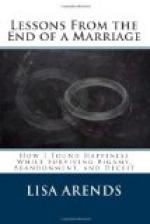Every man and woman values certain qualities highly, and in proportion as another fails to manifest these particular qualities he is classed as “low,” and his society is not valued.
This is the great source of trouble between husbands and wives. Each values his or her own qualities and despises the other’s. So in their own minds they are not equal, and the first principle of harmony is missing.
The real truth is that in marriage a man is schoolmaster to his wife and she is equally schoolmistress to him. This is true in a less degree, of all the relationships of life.
The Law of Attraction draws people together that they may learn.
There is but one Life, which is growth in wisdom and knowledge.
There is but one Death, which is refusal to learn.
If husbands and wives were equals in their own minds they would not despise each other and refuse to learn of each other.
The Law of Attraction, or Love, almost invariably attracts opposites, and for their own good. A visionary, idealistic woman is drawn to a practical man, where, kick and fuss and despise each other as they will, she is bound to become more practical and he more idealistic. They exchange qualities in spite of themselves; each is an unconscious agent in rounding out the character and making more abundant the life of the other.
Much of this blending of natures is accomplished through passion, the least understood of forces. And the children of a union of opposites, even where there is great contempt and unhappiness between the parents, are almost invariably better balanced than either of the parents.
I cannot believe that unhappy marriages are “mistakes” or that they serve no good purpose. The Law of Attraction draws together those who need each other at that particular stage of their growth. The unhappiness is due to their own foolish refusal to learn; and this refusal is due to their contempt for each other. They are like naughty children at school, who cry or sulk and refuse to work out their problems. Like those same naughty children they make themselves unhappy, and fail to “pass” as soon as they might.
Remember, that contempt for each other is at the very bottom of all marital unhappiness. The practical man despises his wife’s impulsive idealism and tries to make her over. The wife despises his “cold and calculating” tendencies and tries to make him over. That means war, for it is impossible to make over anybody but yourself.
Because the man despises his wife’s tendencies and she despises his, it never occurs to either to try making over themselves, thus helping along the very thing they were drawn together for.
If Tudor’s picture holds two people who are always equal though utterly different; whose future actions are an unknown quantity to be taken as they come and each action to be met in a spirit of respect and inquiry, with a view to understanding and learning from it; if over and through all his picture Tudor spreads a glow of purpose to preserve his own respect and love for her, at all costs;—if this is the sort of picture Tudor makes in the silence he will surely realize it later.




